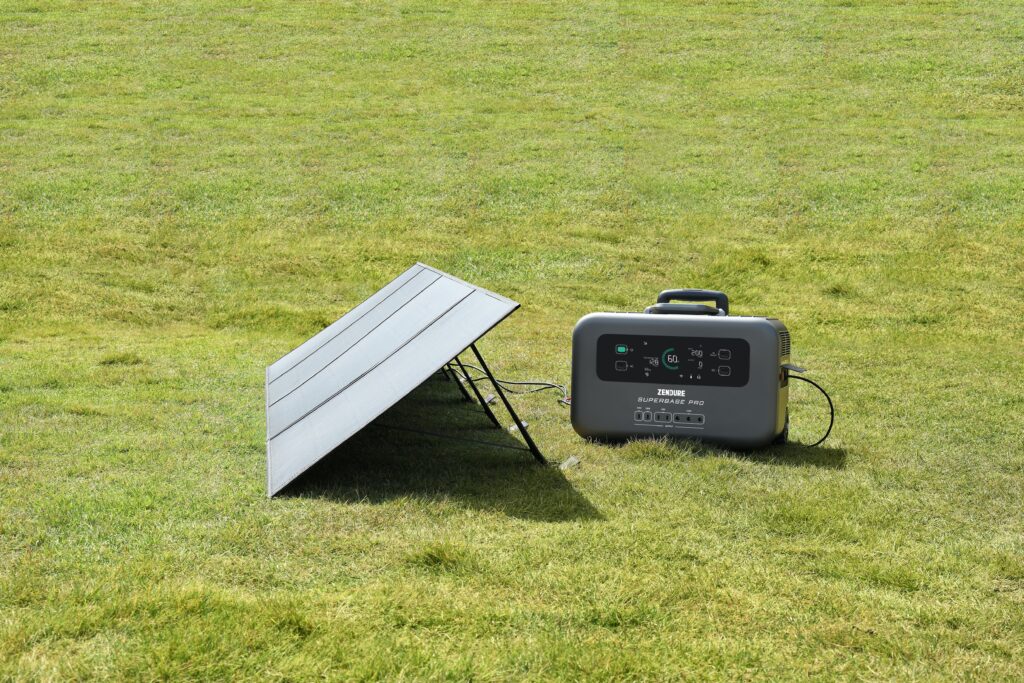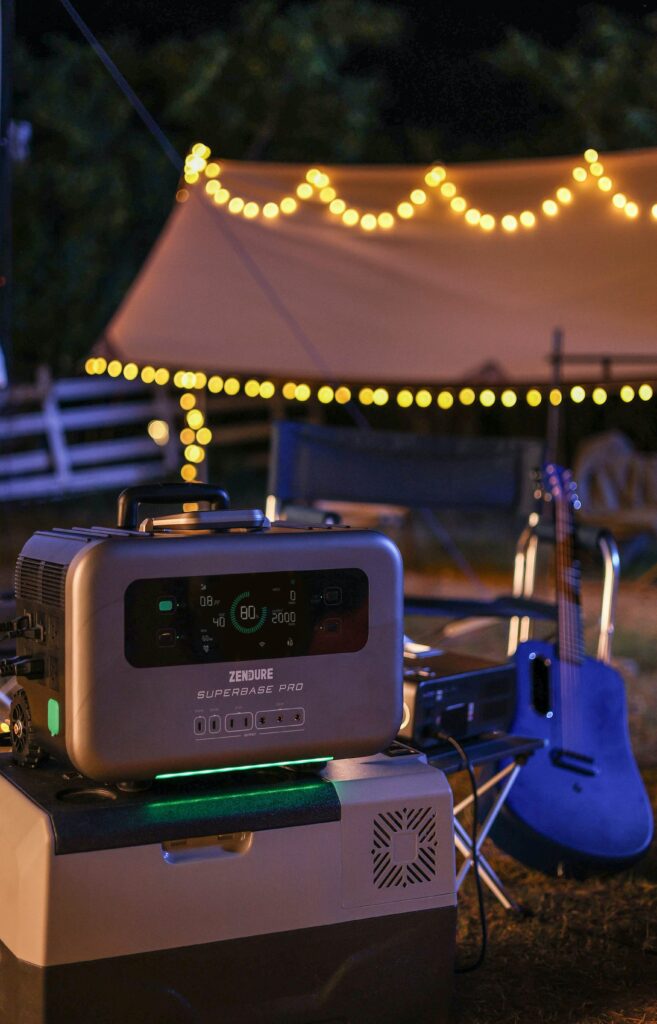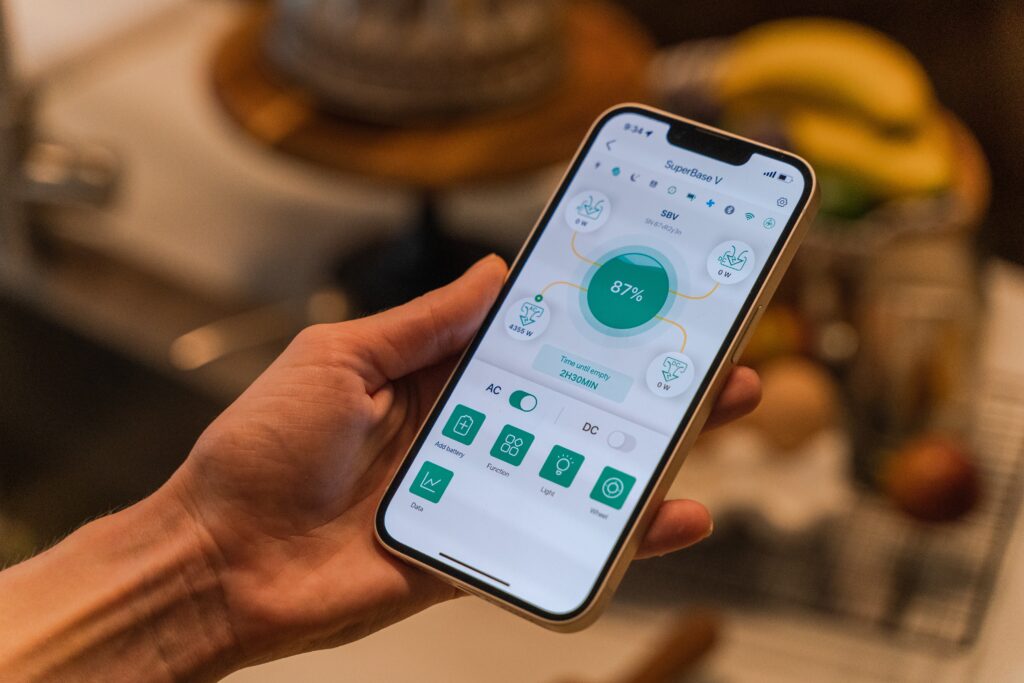So, you’ve been wondering if a solar generator can handle the mighty task of running a refrigerator? Well, you’re in luck! In this article, we’ll explore the possibilities and shed some light on whether or not a solar generator can power this essential household appliance. Get ready to discover the potential of renewable energy and how it could revolutionize your home’s energy consumption. Get your iced drinks and chilled food ready, because we’re about to find out if a solar generator can truly handle the cool challenge of running a refrigerator!

Understanding Solar Energy
Definition of solar energy
Solar energy refers to the radiant light and heat that is emitted by the Sun. It is a renewable source of energy that can be converted into electricity or used as a direct source of heat. Solar energy is harnessed through various technologies such as solar panels and solar thermal systems.
How solar energy is harnessed
Solar energy is harnessed through the use of solar panels, also known as photovoltaic (PV) cells. These panels are made up of semiconductor materials that convert sunlight directly into electricity. When the sunlight hits the solar panels, the photons in the sunlight excite the electrons in the cells, creating an electric current.
Uses of solar energy
Solar energy can be used in a wide range of applications. One of the most common uses is for generating electricity to power homes and businesses. Solar energy can also be used for heating water in residential and commercial buildings through solar thermal systems. Additionally, solar energy can be utilized for powering various appliances, including refrigerators, in remote locations or during power outages.
Solar Generators: An Overview
Components of a solar generator
A solar generator typically consists of three main components: solar panels, a charge controller, and a battery. The solar panels capture sunlight and convert it into electricity. The charge controller regulates the flow of electricity to the battery, preventing overcharging. The battery stores the excess energy generated by the solar panels for later use.
How a solar generator works
When sunlight hits the solar panels of a solar generator, the panels generate a direct current (DC) electricity. This DC electricity is then passed through a charge controller, which ensures that the battery is charged at the optimal rate. The battery stores the electricity until it is needed. When a device, such as a refrigerator, is connected to the solar generator, the battery supplies the stored electricity, which is converted to alternating current (AC) electricity for the appliance to use.
Types of solar generators
There are two main types of solar generators: portable solar generators and stationary solar generators. Portable solar generators are lightweight and can be easily transported, making them ideal for camping trips or other outdoor activities. Stationary solar generators, on the other hand, are designed to be permanently installed and can provide a higher power output, making them suitable for powering homes or commercial buildings.
Benefits and drawbacks of solar generators
Solar generators offer several benefits. Firstly, they are a renewable source of energy, which means they do not deplete natural resources. Additionally, solar generators produce clean energy, with no greenhouse gas emissions or air pollution. They also provide energy independence, allowing users to generate their own electricity. However, solar generators have some drawbacks. They rely on sunlight, so their output can be affected by weather conditions. They also require initial investment and maintenance costs, although the long-term savings on energy bills can offset these expenses.
The Concept of Refrigeration
The operation of a refrigerator
A refrigerator operates on the principle of removing heat from its interior to maintain a cool temperature. This is achieved through a cycle of evaporation and condensation of a refrigerant fluid. The compressor compresses the refrigerant, causing it to become a high-pressure gas. The condenser then cools the gas, causing it to liquefy and release heat. The liquid refrigerant flows through an expansion valve, where it evaporates and absorbs heat from the interior of the refrigerator, creating a cooling effect.
Different types of refrigerators
There are various types of refrigerators available in the market, including top-freezer refrigerators, bottom-freezer refrigerators, side-by-side refrigerators, and French door refrigerators. Each type has its own advantages and features, catering to different needs and preferences. Some refrigerators also come with additional features such as ice makers, water dispensers, and smart technology for enhanced convenience.
Energy requirements of a refrigerator
Refrigerators are energy-intensive appliances, typically accounting for a significant portion of a household’s electricity consumption. The energy requirements of a refrigerator depend on various factors, including its size, age, energy efficiency rating, and usage patterns. Energy-efficient refrigerators are designed to consume less electricity by incorporating advanced insulation, improved compressor technology, and better temperature control mechanisms.
The Energy Consumption of a Refrigerator
Different factors affecting a refrigerator’s energy consumption
Several factors influence the energy consumption of a refrigerator. These include the age and condition of the refrigerator, its size, the frequency of opening and closing the door, the internal temperature settings, and the ambient temperature of the room. Older refrigerators tend to be less energy efficient compared to newer models, as advancements in technology have led to more energy-efficient designs.
Typical wattage of refrigerators
The wattage of refrigerators can vary depending on their size and energy efficiency. On average, a standard-sized refrigerator consumes around 100 to 600 watts of electricity when running. However, it is important to note that refrigerators do not run continuously. They cycle on and off to maintain the desired temperature, which reduces their overall energy consumption.
How to measure a refrigerator’s energy usage
To measure a refrigerator’s energy usage, you can refer to the appliance’s energy label or consult the manufacturer’s specifications. The energy label typically provides information about the refrigerator’s energy efficiency rating, annual energy consumption, and estimated energy costs. Additionally, energy monitors or smart plugs can be used to measure the real-time electricity consumption of a refrigerator.

Analyzing the Capacity of Solar Generators
The output of solar generators
The power output of a solar generator is measured in watts or kilowatts. It indicates the maximum amount of electricity that the solar generator can produce under optimal conditions. The output can vary depending on factors such as the size and efficiency of the solar panels, the charge controller’s capabilities, and the capacity of the battery.
How to assess the power capacity of a solar generator
To assess the power capacity of a solar generator, you need to consider the wattage requirements of the appliances you intend to power. Identify the energy consumption of the refrigerator, as well as any other devices you plan to use simultaneously. Ensure that the solar generator’s power output is sufficient to meet the combined wattage needs of the appliances.
Limitations in the power production of solar generators
Solar generators have certain limitations when it comes to power production. Firstly, their output is dependent on sunlight availability. Cloudy or overcast days can significantly reduce the amount of electricity generated. Additionally, the capacity of the battery limits the amount of stored energy that can be utilized. It is important to consider these factors and determine whether a solar generator can meet your energy needs, especially if you plan to run energy-intensive appliances like refrigerators.
Can A Solar Generator Run A Refrigerator?
Matching the energy demand of the refrigerator with the supply of the solar generator
Whether a solar generator can effectively run a refrigerator depends on the specific energy demand of the refrigerator and the power capacity of the solar generator. To determine if the two are compatible, compare the wattage requirements of the refrigerator with the power output of the solar generator. Ensure that the solar generator can consistently provide enough electricity to meet the refrigerator’s needs, taking into account the refrigerator’s energy consumption patterns.
Possible problems and solutions when running a refrigerator on a solar generator
Running a refrigerator on a solar generator may pose some challenges. Insufficient power capacity in the solar generator can lead to frequent battery drain or inability to maintain a consistent temperature in the refrigerator. To overcome this, you can consider optimizing the refrigerator’s energy efficiency by setting appropriate temperature levels, minimizing door openings, and choosing an energy-efficient model. Alternatively, you can also upgrade to a solar generator with a higher power capacity or consider using a hybrid power system that combines solar energy with other renewable sources.

Typical Solar Generator and Refrigerator Pairings
Best solar generators for small refrigerators
For small refrigerators, portable solar generators with a power output ranging from 1000 to 2000 watts can be suitable. These generators are lightweight and provide enough power to run a small refrigerator efficiently. Some popular options include the Goal Zero Yeti 1000 and the Jackery Explorer 1000.
Best solar generators for medium refrigerators
If you have a medium-sized refrigerator, consider solar generators with a power output of 2000 to 3000 watts. These generators offer sufficient energy capacity to meet the demands of a medium-sized refrigerator. The Lion Energy Solar Generator and the Renogy Phoenix are examples of solar generators that are suitable for medium-sized refrigerators.
Best solar generators for large refrigerators
Large refrigerators require solar generators with higher power capacities to ensure uninterrupted operation. Solar generators with a power output of 4000 watts or more are recommended for large refrigerators. The Goal Zero Yeti 3000 and the EcoFlow Delta are popular options that offer robust power capabilities for running large refrigerators.
Real Life Applications and Case Studies
Experiences with running a refrigerator on a solar generator
Many individuals and households have successfully run refrigerators on solar generators, especially in off-grid or remote locations. These setups provide a reliable and sustainable alternative to traditional grid-powered refrigeration. Users have reported satisfying experiences, noting the energy independence and cost savings achieved through solar-powered refrigeration.
Success stories of using solar generators with refrigerators
Numerous success stories exist regarding the use of solar generators with refrigerators. For example, in rural communities without access to reliable electricity, solar generators have been deployed to power refrigeration systems for storing vaccines and medications. This has greatly improved healthcare delivery and reduced spoilage of essential medical supplies. Additionally, in disaster-stricken areas where power infrastructure is damaged, solar generators have played a crucial role in providing refrigeration for food and medicine storage.
Alternatives to Solar Generators
Other forms of renewable energy for powering a refrigerator
While solar generators offer a practical solution for powering refrigerators, there are alternative forms of renewable energy that can be used. Wind turbines and hydroelectric generators are two examples of renewable energy sources that can be harnessed to meet the energy demands of a refrigerator. These systems, however, may require specific environmental conditions and infrastructure requirements.
Comparison of solar generators with other renewable energy sources
When comparing solar generators with other renewable energy sources, there are several factors to consider. Solar generators offer the advantage of being easily scalable and portable, allowing for flexible deployment. They also have a low environmental impact and do not rely on specific geographical conditions. However, wind turbines and hydroelectric generators may provide a more consistent power output, especially in areas with ample wind or water resources.
Future of Refrigeration and Solar Generators
Trends affecting solar generators and refrigerators
As technology advances, we can expect to see continuous improvements in the efficiency and affordability of solar panels and solar generators. Integration with smart home systems and energy storage solutions is becoming increasingly common, enabling more efficient energy management. Likewise, refrigerators are evolving with features such as better insulation, advanced temperature control, and connectivity options for enhanced energy efficiency.
Innovations in solar generators
Innovations in solar generators are centered around improving power capacity, energy storage capabilities, and portability. Manufacturers are exploring the use of advanced battery technologies, such as lithium-ion batteries, for higher energy density and improved performance. Furthermore, the integration of solar panels into portable generators is being optimized to maximize energy generation and minimize size and weight.
Changing energy demands of refrigerators
The energy demands of refrigerators are continually evolving due to various factors. Energy efficiency regulations and consumer demand for eco-friendly appliances are driving manufacturers to produce more energy-efficient refrigerators. Additionally, advancements in insulation, compressor technology, and temperature management systems are reducing the energy consumption of refrigerators, making them even more compatible with solar generators.
Potential developments in the use of solar generators with refrigerators
In the future, we can anticipate increased compatibility and integration between solar generators and refrigerators. Improved power capacity and energy storage capabilities in solar generators will allow for more efficient and reliable operation of refrigerators. Furthermore, advancements in monitoring and control systems will enable users to optimize energy usage and prioritize essential appliances, such as refrigerators, during times of limited solar generation.
In conclusion, solar generators can effectively power refrigerators, but careful consideration and proper matching of energy demands are crucial. With the right solar generator and thoughtful usage, running a refrigerator on solar energy can provide a sustainable and reliable solution for cooling and preserving food and other perishables. As technology continues to advance and renewable energy systems become more prevalent, the combination of solar generators and refrigeration is poised to play a significant role in shaping the future of sustainable energy usage.




